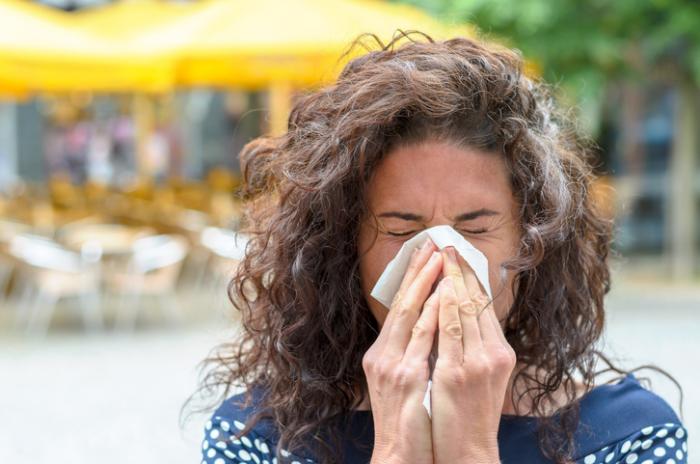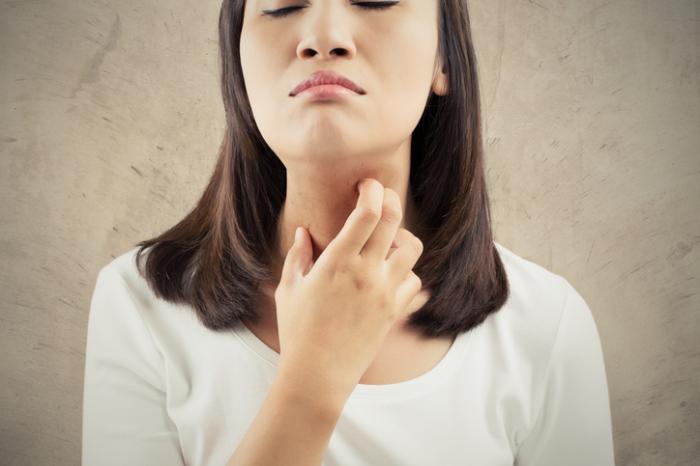How To Get Rid Of Itchy Throat At Night
We include products we think are useful for our readers. If you buy through links on this page, we may earn a small commission. Here's our process.
Almost everyone experiences the nuisance of an itchy throat from time to time. Itchy throats are a very common sign of hay fever and other allergies or may be an early sign of a viral or bacterial infection.
Most of the time, itchy throats can be managed with simple over-the-counter (OTC) treatments and home remedies.
Irritated itchy throats can be caused by a wide variety of factors. Likely causes of an itchy throat include the following:
Allergic rhinitis

A common cause of itchy throat is allergic rhinitis, which is also known as hay fever.
Also known as hay fever, allergic rhinitis may be one of the most common causes of an itchy throat. As many as 40 to 60 million Americans are affected by it.
Allergic rhinitis happens when the body overreacts to an otherwise harmless substance, releasing a chemical called histamine that causes these overreactions.
Common triggers include pollen, dander, dust, and irritants such as cigarette smoke or exhaust fumes.
Food allergies
Allergic reactions to food happen when the body reacts to certain things we eat as if they were going to harm the body. Reactions generally develop within minutes or a few hours after consuming the trigger food.
The allergy may be mild with symptoms stopping with an itchy throat or mouth. However, they can be life-threatening.
Common trigger foods include peanuts, shellfish, eggs, milk, and wheat.
Drug allergies
Many people suffer from allergies to certain medications including penicillin and other antibiotics. The severity of the allergy will range from mild to life-threatening.
Symptoms of a drug allergy can include an itchy throat that starts shortly after taking a new medication.
Bacterial and viral infections
Strep throat or bacterial cases of tonsillitis may start with an itchy throat before progressing to a more severe sore throat.
Viruses such as the common cold or the flu virus can both cause an itchy throat.
If it is just a cold, the itchy throat is unlikely to progress past being mildly sore. If a person has a flu infection, their throat soreness will be more severe and accompanied by fever, body aches, and chest discomfort.
Dehydration
Dehydration occurs when the body loses more water than it takes in. It is common during hot weather, after exercise, or during illness.
Dehydration can cause a dry mouth, a temporary condition where the mouth and throat don't have enough saliva. This may cause an itchy feeling in the throat.
Acid reflux

A symptom of itchy throat may be stomach acid that enters the food pipe, also known as heartburn.
Also known as heartburn, some people with chronic acid reflux experience throat problems. Acid reflux happens when stomach acid backs up from the stomach into the food pipe.
An itchy or sore throat is unlikely to be the only symptom of reflux. However, some people have a condition called silent reflux and may only notice a chronic, itchy throat as a symptom.
Medication side effects
Some medications may cause dry coughs and itchy throats that are not due to allergic reactions.
People taking ACE inhibitors for high blood pressure should be aware that ACE inhibitors may cause an itchy throat and dry cough.
Most often, these symptoms begin shortly after starting an ACE inhibitor and are not accompanied by other symptoms commonly experienced with an itchy throat.
Often, an itchy throat is not the only symptom that a person may be dealing with. Symptoms that occur along with an itchy throat vary with the underlying cause.
Itchy throats caused by allergic rhinitis may be accompanied by any combination of the following symptoms:
- runny or stuffy nose
- sinus pressure
- itchy eyes and skin
- sneezing
- tiredness
- swollen, red, or watery eyes
When caused by drug or food allergies, an itchy throat may occur together with any number of symptoms from mild to needing immediate emergency medical treatment.
The symptoms that can occur with an itchy throat due to drug and food allergies include:
- a red itchy rash known as hives
- redness of the skin around the eyes
- itchy ears
- nausea and vomiting
- diarrhea
- stomach pain
- swelling of the lips, tongue, and throat
- trouble breathing or swallowing
- a sense of doom
- drop in blood pressure
- loss of consciousness
It can be difficult to distinguish an itchy throat caused by allergic rhinitis from one caused by illness. In both instances, it may be accompanied by nasal congestion or sneezing.
However, if the itchy throat is caused by an acute illness, it will probably be short-lived and accompanied by a combination of the following symptoms:
- fever
- swollen glands
- muscle aches
- weakness
- a headache
- a cough
- nasal congestion
When the itchy throat is caused by dehydration, other symptoms can include
- extreme thirst
- dry mouth
- infrequent dark urine
If the itchy throat is caused by reflux or heartburn, other symptoms may include:
- difficulty or pain when swallowing
- burning sensation in chest or throat
- gas
- inflamed voice box
- worn down tooth enamel
- inflamed gums
- a bad taste in the mouth
Remedies for an itchy throat can vary based on the cause. However, there are some tried and tested remedies that may help in most cases.
These remedies, some of which are available to buy online, include the following:
- a spoonful of honey to coat the throat
- salt water gargles
- lozenges and cough drops
- nasal spray
- hot tea with lemon and honey
Using over-the-counter allergy medications and nasal sprays can relieve an itchy throat caused by allergies. For the common cold, an over-the-counter cold medication can help.

Avoiding caffeine and alcohol as well as drinking plenty of water may help to prevent itchy throat.
There are steps that those prone to an itchy throat can take to prevent one from occurring. These steps vary based on the cause of the itchy throat.
Most people will find that they can reduce the risk of an itchy throat if they do the following:
- quit smoking
- drink plenty of water
- avoid caffeine and alcohol
- wash hands frequently during cold and flu season
- avoid opening windows and going outside during allergy season
When to see a doctor
A doctor does not always need to examine an itchy throat. In fact, an itchy throat responds well to self-care most of the time.
A person should call their doctor if the symptoms last for more than 10 days, get worse, or don't respond to self-care.
People should see a doctor immediately in the event of an itchy throat being accompanied by any of the following symptoms:
- trouble breathing
- wheezing
- hives
- facial swelling
- a severe sore throat
- fever
- difficulty swallowing
Any of the above situations may require immediate medical care, treatment with antibiotics or antiviral medication, or management of serious allergies.
Read the article in Spanish.
How To Get Rid Of Itchy Throat At Night
Source: https://www.medicalnewstoday.com/articles/317066
Posted by: loganloyed1976.blogspot.com

0 Response to "How To Get Rid Of Itchy Throat At Night"
Post a Comment